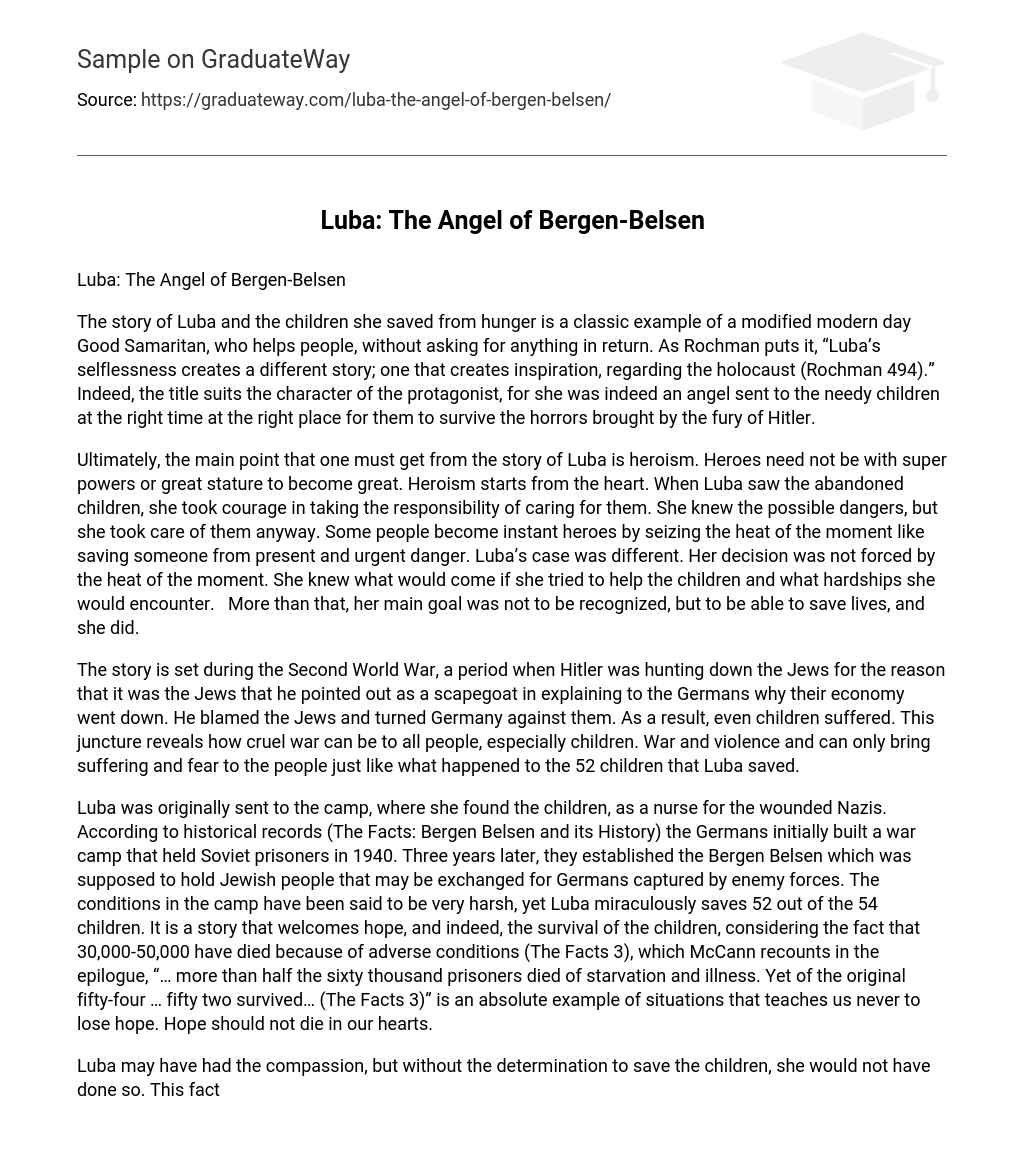The story of Luba and the children she saved from hunger is a classic example of a modified modern day Good Samaritan, who helps people, without asking for anything in return. As Rochman puts it, “Luba’s selflessness creates a different story; one that creates inspiration, regarding the holocaust (Rochman 494).” Indeed, the title suits the character of the protagonist, for she was indeed an angel sent to the needy children at the right time at the right place for them to survive the horrors brought by the fury of Hitler.
Ultimately, the main point that one must get from the story of Luba is heroism. Heroes need not be with super powers or great stature to become great. Heroism starts from the heart. When Luba saw the abandoned children, she took courage in taking the responsibility of caring for them. She knew the possible dangers, but she took care of them anyway. Some people become instant heroes by seizing the heat of the moment like saving someone from present and urgent danger. Luba’s case was different. Her decision was not forced by the heat of the moment. She knew what would come if she tried to help the children and what hardships she would encounter. More than that, her main goal was not to be recognized, but to be able to save lives, and she did.
The story is set during the Second World War, a period when Hitler was hunting down the Jews for the reason that it was the Jews that he pointed out as a scapegoat in explaining to the Germans why their economy went down. He blamed the Jews and turned Germany against them. As a result, even children suffered. This juncture reveals how cruel war can be to all people, especially children. War and violence and can only bring suffering and fear to the people just like what happened to the 52 children that Luba saved.
Luba was originally sent to the camp, where she found the children, as a nurse for the wounded Nazis. According to historical records (The Facts: Bergen Belsen and its History) the Germans initially built a war camp that held Soviet prisoners in 1940. Three years later, they established the Bergen Belsen which was supposed to hold Jewish people that may be exchanged for Germans captured by enemy forces. The conditions in the camp have been said to be very harsh, yet Luba miraculously saves 52 out of the 54 children. It is a story that welcomes hope, and indeed, the survival of the children, considering the fact that 30,000-50,000 have died because of adverse conditions (The Facts 3), which McCann recounts in the epilogue, “… more than half the sixty thousand prisoners died of starvation and illness. Yet of the original fifty-four … fifty two survived… (The Facts 3)” is an absolute example of situations that teaches us never to lose hope. Hope should not die in our hearts.
Luba may have had the compassion, but without the determination to save the children, she would not have done so. This fact teaches us the value of determination in achieving our goals. Because of her determination, she was even able to convince other people to cooperate with her. Goodwill can be contagious, but only if the person doing it has the determination to go on despite the odds. Luba was just one person, but she made a difference.
Luba’s choice earned for her the reason why she was spared by the Nazis that hunted Jews to kill them. Her life story shows how every person’s life has a purpose to serve. No one is born for himself or herself. The epilogue further tell us that the Dutch welcomed her as a national hero, and Queen Wilhelmina herself offered her to stay and promised that “she will be taken care of for the rest of her life (McCann 48).” A very tempting offer, but she has found the purpose of her life – to overseer the orphans of Bergen Belsen… so she went back to care for the new orphans. She may have lost her son, but she found more children to love in return.
Works Cited
McCann, Michelle Roehm, Tryszynska-Frederick, Luba, Marshall, Ann E. Luba: The Angel
Of Bergen-Belsen. Tricycle Press, 2003.
“The Facts: Bergen Belsen and Its History.” Squidoo. 2008. 10 September 2008
http://www.squidoo.com/Bergen-belsen
Rochman, Hazel. Booklist, 11/1/2003, Vol. 100 Issue 5, p494-495, 2p. (Book Review).
Ebscohost database.





